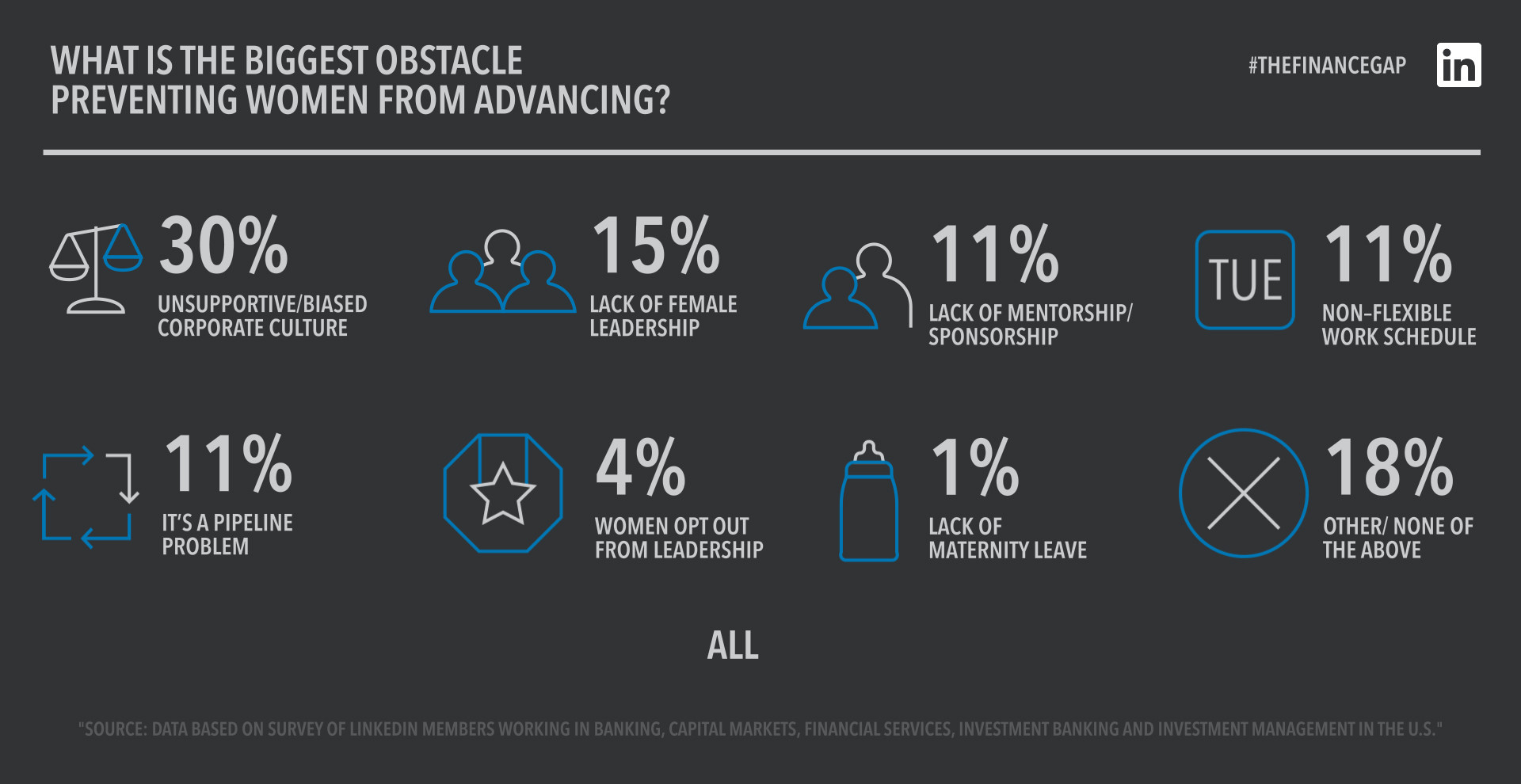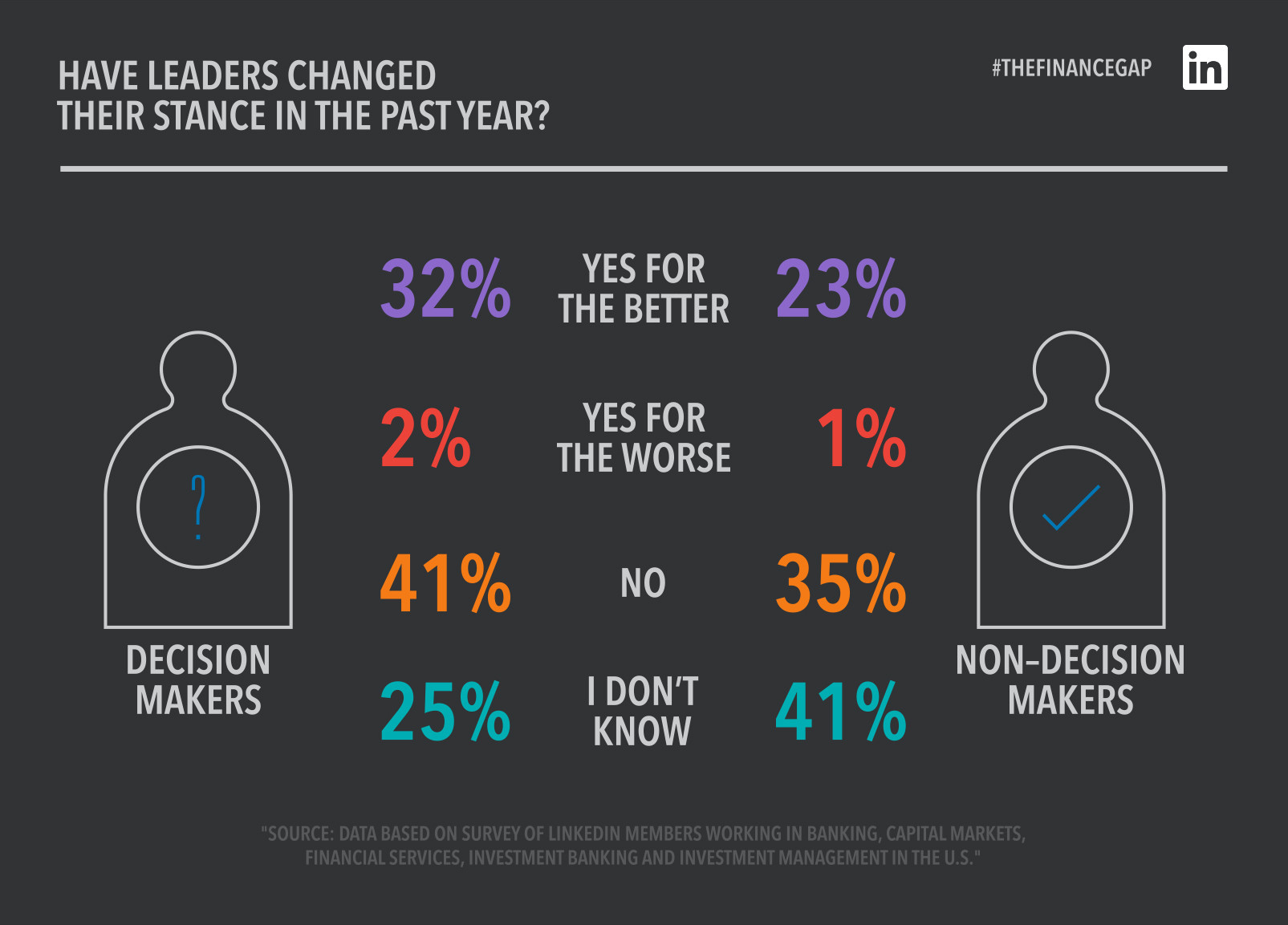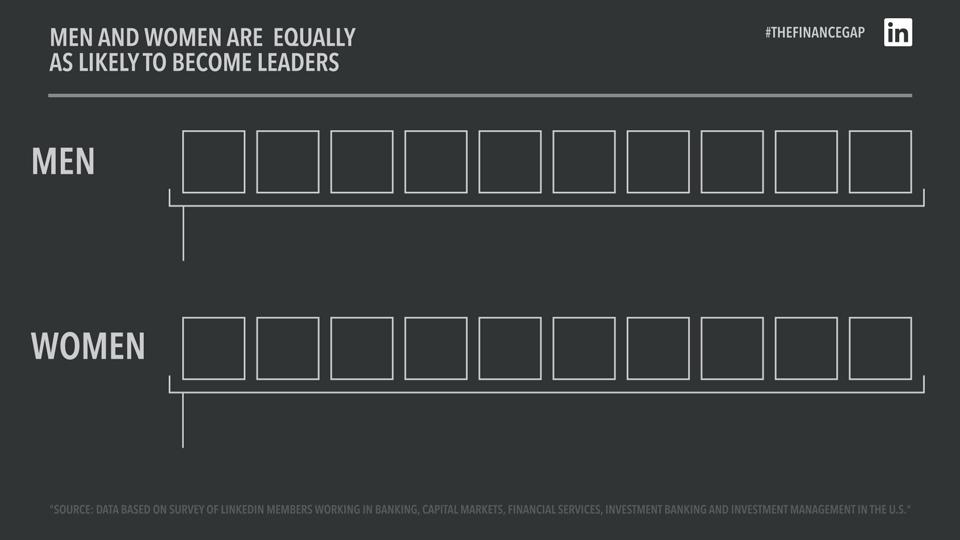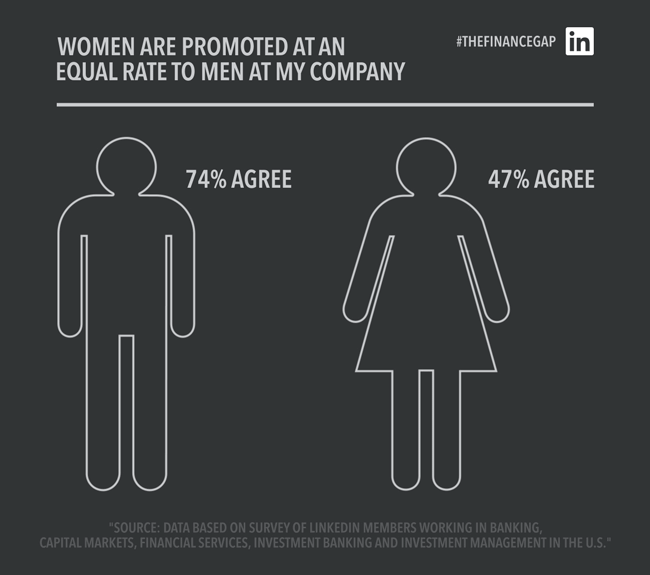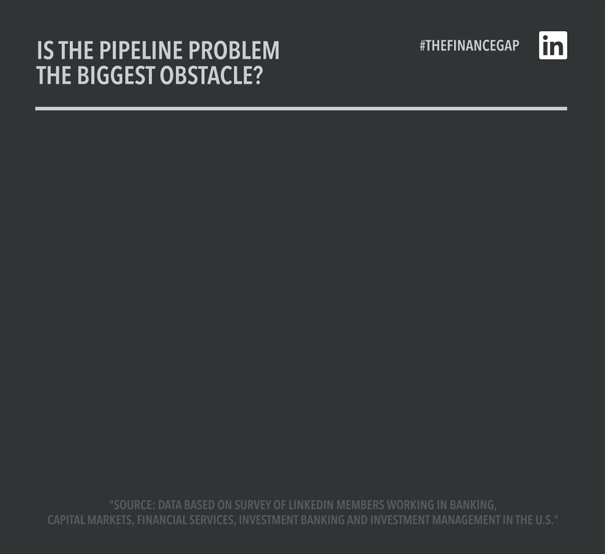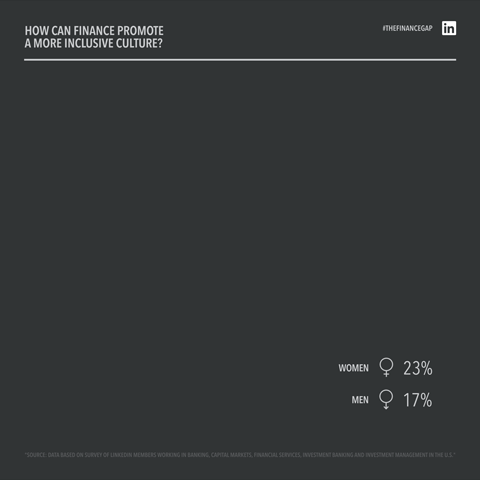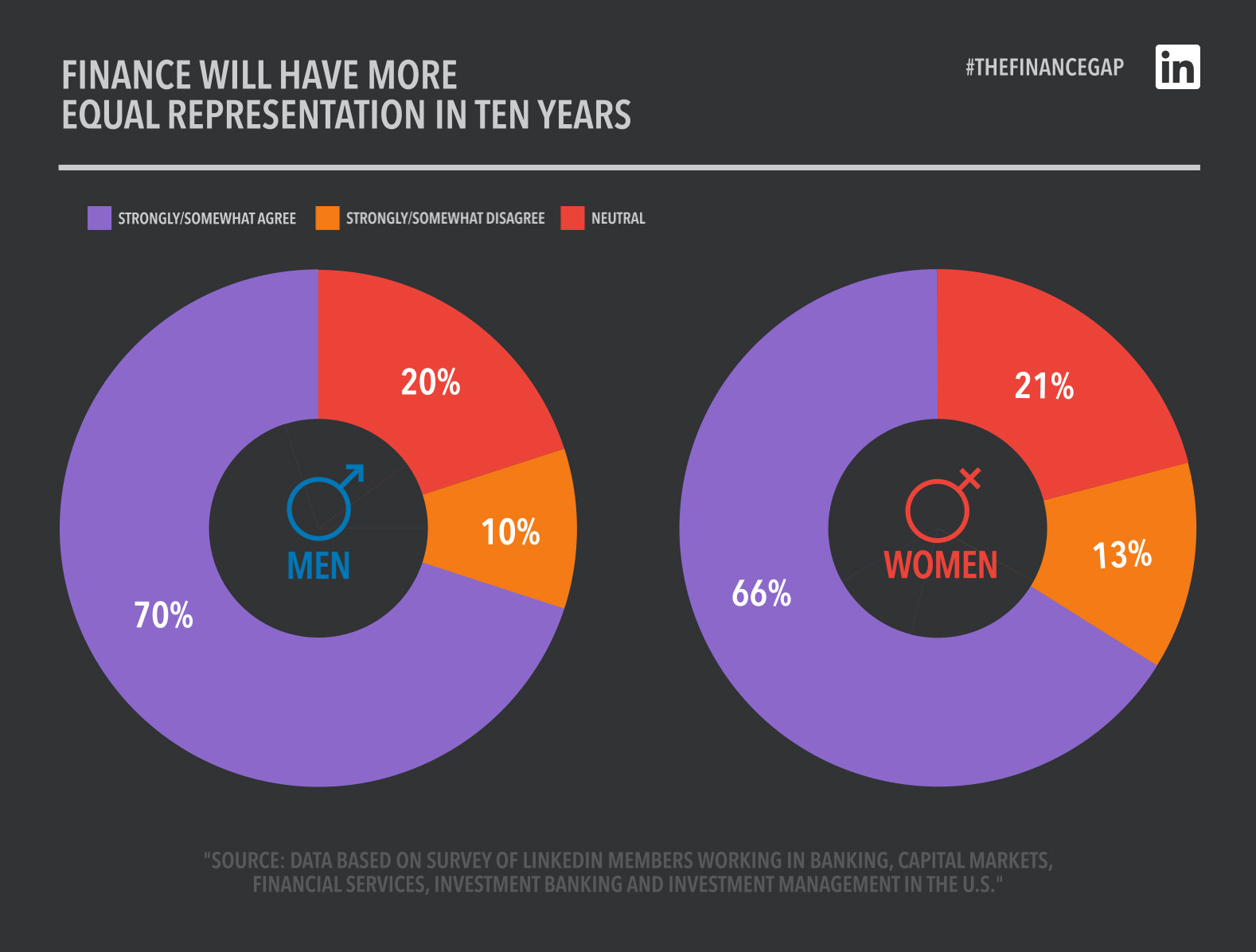Where women in finance see a gender gap, men don’t
June 26, 2018 by Caroline Fairchild
Female finance workers believe they don’t have the same opportunity as their male peers when it comes to career advancement and pay. Men in the industry see a very different picture.
This disconnect emerges in our survey, in partnership with CNBC’s Closing The Gap series, on the state of gender in the finance industry. We received more than 1,000 responses from LinkedIn members working in banking, capital markets, financial services, investment banking and investment management in the U.S. Each of them expressed their opinions on barriers to success for women across the industry. We then asked leaders driving the discussion on these issues like KeyBank CEO Beth Mooney, Ellevest Founder Sallie Krawcheck and Fidelity Investments President Kathleen Murphy to help explain the numbers and provide possible solutions.
Workers agree that there is a bias in the corporate culture of finance that continues to hold women back. Yet there is disagreement between men and women — as well as senior leaders and entry-level associates — on whether the industry is changing. While men believe women have equal access to promotion and raises, women do not. And while decision-makers believe that the rise of the #MeToo movement is making people more accountable, those lower down the corporate ladder haven’t seen many signs of progress.
We want to hear from you: Have ideas of your own on the state of diversity in finance? Join the series on LinkedIn with an article, post or video that includes #TheFinanceGapsomewhere in the body.
Here are the results:
About a third of finance professionals believe that a biased corporate culture is holding women back.
When asked what the biggest obstacle was to women advancing in finance, men and women agreed that an unsupportive or biased corporate culture still plays a big role. Survey respondents also flagged a lack of female leadership as a top barrier for women rising up the ranks in finance. Fewer than 17% of senior leaders in investment banking are women and just 30% of executives in commercial banking are female, according to data from Catalyst.
People in senior roles are more likely to believe that gender discrimination is receding.
In the era of #MeToo, roughly four in 10 women and men working in finance believe their company’s leaders have changed their stance on gender discrimination and harassment in the past year. That said, nearly half of survey respondents who do not participate in hiring decisions disclosed that they “don’t know” whether their leaders have changed their stance. This finding suggests that entry-level employees don’t have as much visibility to changes in policy or behavior than management would likely hope.
Female leaders aren’t bullish that other women will follow them up the corporate ladder.
While 56% of male survey respondents indicated that men and women are equally likely to become leaders in their industry, only 37% of females indicated the same. When it comes to women in primary decision-making roles, only 39% expressed confidence that opportunities were equal to workers across gender. The takeaway? Despite their advancement, women in leadership are not optimistic that their own experience will be replicated.
“Even if you do the same amount of work as a guy, it’s like you have to work harder,” a female managing director at a prominent investment firm in New York City told LinkedIn. “Then you have to talk about it all the time and you have to talk about it with more people.”
Fewer than half of women believe that they have the same opportunities as their male peers.
Nearly three out of four male survey respondents agree that “men and women are promoted at an equal rate.” Less than half of female respondents felt the same way. A vice president at Morgan Stanley, only agreeing to speak on the condition of anonymity for fear of retribution, told LinkedIn that she’s watched as three of her male colleagues have gotten promoted without any indication that a role was on the table to even consider. She met with her managing director to discuss quarterly goals and assignments she’d like to lead. Yet the same men who she claims are not scheduling those separate meetings continually get the choice assignments. “I feel like I have to shine to get that promotion and they can just show up,” she said.
Men are convinced that their female peers are paid the same, but women remain doubtful.
While 75% of males believe that men and women working at the same level are paid the same at their companies, only 40% of females think that is true. When asked later on in the survey for solutions to help women succeed, several respondents cited “equal pay for equal work” as a top concern.
“If we can all get on the same playing field with pay, regardless of our gender, that might not break the glass ceiling, but it could crack it,” said Veronica Bray, a managing partner at Retirement Plan Advisory Search.
Men are much more likely to believe that the “pipeline problem” in finance is real.
The “pipeline problem” — or the notion that there are too few women entering the finance promotion to fix the gender gap — is one of the more controversial topics when thinking about solutions. While only 7% of women said that the pipeline of female talent is a problem, nearly twice as many male respondents said they believe the problem is real.
Everyone agrees that a more flexible schedule could help more women in the industry succeed.
The demanding hours of many jobs in financial services remains a top reason why people in the industry believe more women aren’t making it to the top. Survey respondents also cited more opportunities for mentorship and sponsorship as a top way to make women feel more supported in their career. Katherine Breiding, an associate for Goldman Sachs in Salt Lake City, told LinkedIn that she has had several female mentors during her career. These women have families and still have made it to higher levels within the firm, giving her confidence that she will be able to the same one day.
Despite these obstacles, workers remain optimistic that change for the better is coming to the finance industry.
While survey respondents indicated that there are still many obstacles preventing women from succeeding in finance, professionals across the industry still think things are improving. While 66% of women agree that the finance industry will shift toward more equal representation in the next 10 years, some 70% of male respondents felt the same way.
Methodology: The LinkedIn online member survey was conducted from April 18 to April 27, 2018 with 1,010 professionals working in banking, capital markets, financial services, investment banking and investment management in the United States. Respondents self-identified their gender and were invited on a random basis.
#TheFinanceGap #ClosingTheGap
